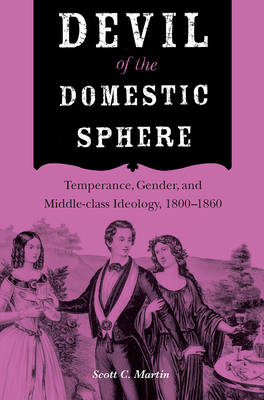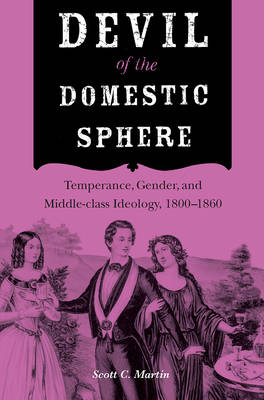
- Retrait gratuit dans votre magasin Club
- 7.000.000 titres dans notre catalogue
- Payer en toute sécurité
- Toujours un magasin près de chez vous
- Retrait gratuit dans votre magasin Club
- 7.000.0000 titres dans notre catalogue
- Payer en toute sécurité
- Toujours un magasin près de chez vous
Devil of the Domestic Sphere
Temperance, Gender, and Middle-class Ideology, 1800–1860
Scott C MartinDescription
Drink, in the minds of antebellum temperance reformers, represented the threat of an increasingly urban, industrial world. Contrasting the drunkards' lack of restraint with their own thrift and sobriety, these members of the emerging middle class lay claim to respectability, virtue, and moral leadership. As they sought to legitimate their own authority, reformers also employed temperance literature to propagate middle-class ideas about the nature of women and their role as guardians of the home.
Stories of women as innocent victims and loving saviors filled temperance literature. Ministers, novelists, and journalists portrayed wives beaten by drunken husbands; poets and songwriters extolled mothers and sisters who rescued men from demon drink. Yet a strand of misogyny also ran through temperance ideology. Denunciation of women as causes of intemperance and snares for men, and celebration of women's victimization often coexisted with a more positive assessment of women's role in the emerging middle class. Unless a woman remained vigilant, she too might succumb to drink, and reformers had very little sympathy for such a fallen angel.
By examining the contradictory images of women employed by the antebellum temperance movement, Scott Martin reveals the reformers' commitment not only to social betterment but also to middle-class interests and a particular gender ideology. Martin explores the reasons why more men than women drank, the ways in which society dealt with women who neglected familial and social obligations to become drunkards, and the consequences of women's failure to eradicate male drunkenness.
Spécifications
Parties prenantes
- Auteur(s) :
- Editeur:
Contenu
- Nombre de pages :
- 216
- Langue:
- Anglais
- Collection :
Caractéristiques
- EAN:
- 9780875806396
- Date de parution :
- 28-05-10
- Format:
- Livre broché
- Format numérique:
- Trade paperback (VS)
- Dimensions :
- 150 mm x 229 mm
- Poids :
- 294 g

Les avis
Nous publions uniquement les avis qui respectent les conditions requises. Consultez nos conditions pour les avis.






